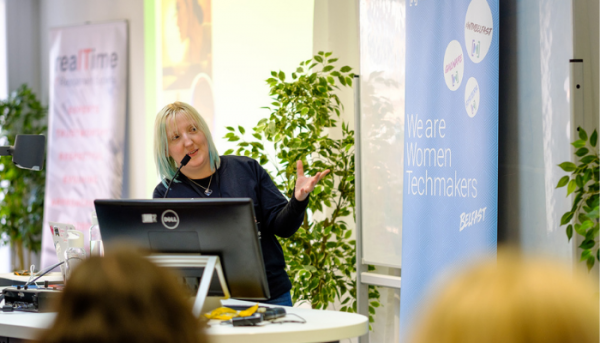Danielle Topping talks to nijobfinder and tells us how she became a Senior Software Engineer at Rapid7
Give a brief outline of your career to date.
It’s a fairly short story so far. I started out with my placement year in Liberty IT, and returned to them when I graduated. I spent a further nine years with them, getting to move between teams and up the ranks, before moving on to Bazaarvoice, where I stayed for nearly three years, and I’m currently working in Rapid7, who I joined in September 2020.
What was your favourite subject at school?
It feels like quite the nerdy cliche, but I loved maths. It made sense to me, and I had a really supportive teacher, which makes all the difference.
Did you go on to further/ higher education, if so what did you study and where?
I did, I studied Computer Science at Queen’s University.
Is this what you always wanted to do?
Absolutely not! I wanted to study psychology at university, and when I didn’t get the grades that I needed, I was devastated. I now believe it was the best thing that could have happened to me.
I got into Computer Science through clearing, and whilst I did enjoy computing at school I had no interest in pursuing it as a career. My sister convinced me to give it a go, and I’m grateful that she did.
The big difference was that in school we were learning how to use computers, whereas in university I was learning how to program them and change what they do, it was a completely different world and I loved it.
This is why I’m involved in STEM efforts to talk to young people about the industry, and help them understand it’s different (and better!) than what they might experience in school.
Were there any particular essential qualifications or experience needed?
For the placement year I only needed to be studying a relevant degree, and then for the graduate role I needed at least a 2:1 in my degree.
Are there alternative routes into the job?
There are many, and more being created regularly. For example, there are apprenticeship programs that combine learning in a paid job with formal learning in Belfast Met. Another option are Sure Skills programs in specific areas, provided by the Department of Finance working with local companies.
Master Degree conversion courses are also available, in both full and part time, as are “boot camps” designed to support self learning. It is definitely easier to get your foot in the door with a recognised qualification, but it’s possible for some people without any.
What are the main personal skills your job requires?
Being able to work well with other people is essential. You need to be able to communicate clearly to ensure problems, and their solutions, are understood. Similarly you need to be able to translate technical concepts for folk in different roles who don’t need that level of detail.
What does a typical day entail?
There isn’t much of a template. First thing I’ll catch up on emails and slack messages, and any code reviews I’ve been sent to look at by teammates.
After that it depends on what I’m currently working on. It might be head down coding for a while, or meeting with other folk to plan and design out future tasks. I’ll usually have a few video calls with the team, one for daily standup where we all give our current status, and others as needed if someone, including myself, needs some help with the task they’re looking at.
What are the best and most challenging aspects of the job?
The best part is definitely getting feedback from users that a change you worked on has made their job easier.
The most challenging part is staying up to date with new technologies. There’s so much constantly evolving that it can be tough to know where to focus learning.
Why is what you do important?
Specifically with what I do at Rapid7, our work is in cybersecurity, and while the world moves more online, there are more threats to it, so it’s important that we can help reduce the risk and impact of those.
What advice would you give anyone looking to follow a similar career path?
Focus on mastering the basics. As much as new languages come around, and things develop and evolve, core concepts stay the same, and if you can get to really understanding them then it’s a lot easier to take on the rest.
Also, get comfortable saying “I don’t know”, because often you won’t, but that’s the first step to getting to know.
If you weren’t doing this what would you like to do?
If I still had to work, then I’d like to teach; it’s always interested me. If I’ve won the lottery then I’m away travelling!
What is the one piece of advice you would give to yourself on your first day?
Ask questions. It’s the best way to learn, and it can also help your more experienced teammates consider things they otherwise wouldn’t.
Describe your ideal day off.
I’d definitely have a lie in first. Assuming we’re in a non-pandemic world, I’d take my nephews ice skating, then meet friends for dinner in The Garrick. After that I’d go watch the Giants play, then head out for a night of dancing!
And finally, what’s the key to any successful job search?
Talk to people. Researching the places you’re interested in is vital, and the best way to do that is to talk to people who are there, or who have been there. Getting to chat to folk on the ground will help you find out things you otherwise wouldn’t about what it’s really like to be there.
Follow nijobfinder on Facebook, Twitter and LinkedIn to see the latest jobs and to ensure your dream job won’t pass you by.


